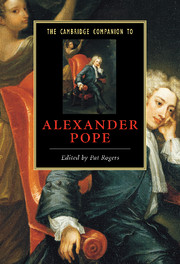Book contents
- Frontmatter
- Introduction
- 1 Pope, self, and world
- 2 Pope’s friends and enemies: fighting with shadows
- 3 Pope’s versification and voice
- 4 Poetic spaces
- 5 Pope’s Homer and his poetic career
- 6 Pope and the classics
- 7 Pope and the Elizabethans
- 8 Pope in Arcadia: pastoral and its dissolution
- 9 Pope and ideology
- 10 Pope and the poetry of opposition
- 11 Crime and punishment
- 12 Landscapes and estates
- 13 Money
- 14 Pope and the book trade
- 15 Pope and gender
- 16 Medicine and the body
- 17 Pope and the other
- Further reading
- Index
17 - Pope and the other
Published online by Cambridge University Press: 28 April 2008
- Frontmatter
- Introduction
- 1 Pope, self, and world
- 2 Pope’s friends and enemies: fighting with shadows
- 3 Pope’s versification and voice
- 4 Poetic spaces
- 5 Pope’s Homer and his poetic career
- 6 Pope and the classics
- 7 Pope and the Elizabethans
- 8 Pope in Arcadia: pastoral and its dissolution
- 9 Pope and ideology
- 10 Pope and the poetry of opposition
- 11 Crime and punishment
- 12 Landscapes and estates
- 13 Money
- 14 Pope and the book trade
- 15 Pope and gender
- 16 Medicine and the body
- 17 Pope and the other
- Further reading
- Index
Summary
The “other” has become a prominent theme in literary critical analysis. At the social and political level, its currency has been the result of two significant social and political events in the twentieth century: the clashes between colonizer and colonized in the 1940s and 50s, and the development of the new feminist movement in the 1970s. The rise of post-colonial studies and of feminist theory - the intellectual counterparts of these events - have profoundly influenced Anglo-American literary criticism of the late twentieth century. The “other” is the calling card of these critical paradigms. In relation to Western European literature, the concern with the “other” leads primarily to an attention to the representation of women or of indigenous or non-European peoples in literary texts. For instance, the passage on the “poor Indian” in the first epistle of Alexander Pope’s Essay on Man stands out as an example of the status of native Americans in the early-eighteenth century imagination:
Lo! the poor Indian, whose untutor’d mind Sees God in clouds, or hears him in the wind; His soul proud Science never taught to stray Far as the solar walk, or milky way; Yet simple Nature to his hope has giv’n, Behind the cloud-topt hill, an humbler heav’n; Some safer world in depth of woods embrac’d, Some happier island in the watry waste, Where slaves once more their native land behold, No fiends torment, nor Christians thirst for gold! To Be, contents his natural desire, He asks no Angel’s wing, no Seraph’s fire; But thinks, admitted to that equal sky, His faithful dog shall bear him company.
(i, 99–112)- Type
- Chapter
- Information
- The Cambridge Companion to Alexander Pope , pp. 222 - 236Publisher: Cambridge University PressPrint publication year: 2007
- 1
- Cited by

